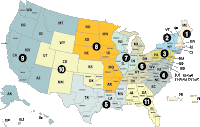In 2010, the Commissioner issued four summonses to third-party financial institutions to determine whether the Tribe had complied with its federal withholding requirements during the period from 2006 to 2009. The Tribe petitioned to quash the summonses on the grounds of sovereign immunity, improper purpose, relevance, bad faith, and overbreadth. The district court denied those petitions. Because we conclude that tribal sovereign immunity does not bar the issuance of these third-party summonses, the district court did not clearly err when it found that the summonses were issued for a proper purpose, and the Tribe lacks standing to challenge the summonses for overbreadth, we affirm.
"Indian tribes are required by law to deduct and withhold income taxes from gambling revenues paid to Indian tribe members. 26 U.S.C. § 3402(r)(1). Indian tribes are also subject to backup withholding, id. § 3406(a), and reporting requirements, id. § 6041(a). In 2005, the Commissioner of the Internal Revenue Service began to investigate the Miccosukee Tribe to determine whether the Tribe had complied with its reporting and withholding requirements."
"After finding that the Tribe had failed to comply with its tax obligations from 2000 to 2005, the Commissioner extended his investigation to the period from 2006 to 2009." As part of its investigation, "the Commissioner issued summonses to American Express, Citibank, Morgan Stanley, and Wachovia Bank to produce documents associated with the bank and brokerage accounts maintained by the Tribe at those institutions." The Tribe sought to quash the summonses. The Eleventh Circuit held:We recognize that Indian tribes ordinarily enjoy sovereign immunity....But the Supreme Court has also explained that tribal sovereign immunity “is not congruent with that which the Federal Government, or the States, enjoy” and “is subject to plenary federal control and definition.”
The claim to tribal sovereign immunity here fails for two reasons. First, the summonses are not suits against the Tribe. Second, tribal sovereign immunity cannot bar a suit by the United States.



0 comments:
Post a Comment